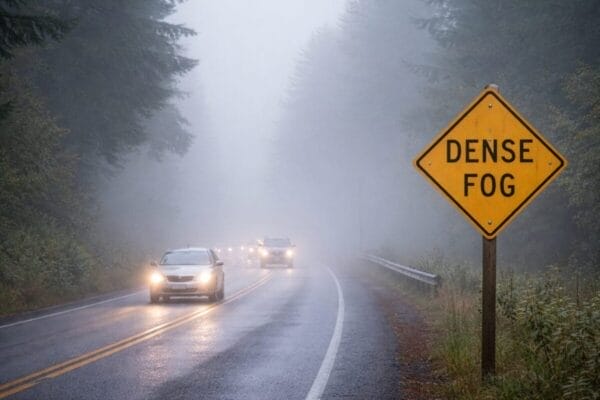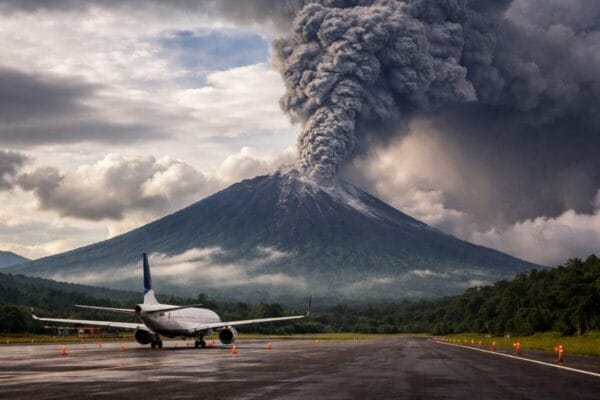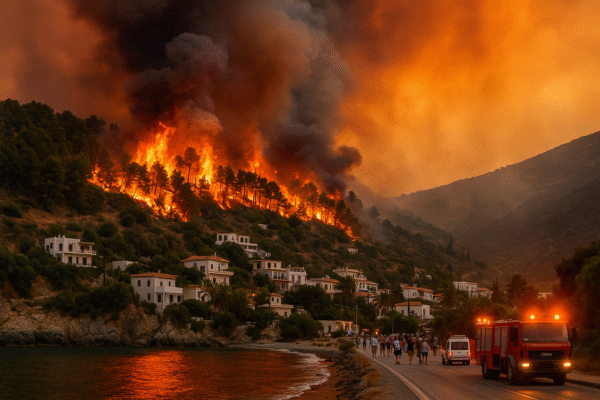A ferocious wildfire has swept across southern Crete, Greece forcing the evacuation of more than 5,000 tourists, hotel staff, and residents from the Ierapetra region. Initial reports confirm no fatalities among tourists, while dozens have received medical attention for smoke-related illnesses. Emergency services are stretched thin battling the blaze, with hundreds of firefighters and aerial support teams deployed alongside local volunteers. Although flights remain largely unaffected, tourism operators must prepare for significant short-term disruptions.
🔥 Wildfire Overview & Progress
- Where & When:
- The wildfire ignited near the hills south of Ierapetra on Crete’s southern coastline in the early hours of July 2, 2025. Northern wind gusts reaching up to 80 km/h accelerated its spread
- Evacuations:
- Over 5,000 individuals—including tourists, hotel employees, and residents—were evacuated from coastal villages, hotels, and resorts. They were relocated to safe zones such as indoor basketball arenas and unaffected hotels
- Local fishermen and coast guard vessels also assisted in evacuating some people by sea overnight
- Firefighting Efforts:
- More than 230 firefighters, supported by 10 water-dumping helicopters and aircraft, are actively combating the blaze
- Fierce gale-force winds, shifting erratically across the region, are fueling flare-ups and hampering containment efforts
- Impact Area:
- The wildfire has ravaged dense forests, agricultural land, homes, and several tourist properties along Crete’s southern coast
- Some smaller settlements, like Agia Fotia, are currently without power, while smoke and ash shroud surrounding villages
- Injuries & Safety:
- Smoke inhalation and respiratory issues have been reported among tourists and locals; fortunately, no deaths have been linked directly to this fire .
- Authorities have issued mobile alerts urging people to avoid re-entering evacuated zones for safety.
✈️ Travel & Tourism Disruptions
- Flight Operations:
- Crete’s two main airports are located on the island’s northern side and remain open. Some international flights are delayed due to airspace congestion from distant strikes, not wildfire impact.
- Hotel & Resort Activity:
- Numerous hotels in Ierapetra and nearby coastal areas are either being evacuated or have suspended services to support firefighter accommodation.
- Tourism operators are preparing for late cancellations, early check-outs, and rerouting guests to unaffected regions such as northern Crete, Rhodes, or Athens.
- Travel Advisories:
- The UK Foreign Office, among others, has urged increased vigilance, advising travelers to activate alerts and stay updated.
- Insurance companies recommend reviewing policies, especially those covering fire evacuation, cancellations, and medical care.
🏥 Industry Response & Recovery
- Greek Emergency Services:
- Authorities have mobilized Greece’s Civil Protection agency and fire units to enact “high-risk fire safety protocols,” including mobile evacuation alerts and road closures.
- In response to escalating fire frequency, Greece deployed approximately 18,000 firefighting personnel this season—bringing enhanced drone surveillance and international coordination to track and manage wildfires.
- Tourism Sector Measures:
- Local tourism associations have promised full cooperation with fire authorities, helping guide tourists, provide temporary shelters, and coordinate clean-up efforts.
- Recovery initiatives following 2023 and 2024 fires include reforestation programs and cooperation with EU-supported firefighter teams, laying groundwork for current restoration and prevention plans.
✅ What Travel Industry Stakeholders Should Do
| Role | Immediate Actions |
|---|---|
| Tour Operators & Travel Agents | Review guest itineraries and reroute bookings to unaffected areas.<br>- Alert travelers to update insurance info and maintain mobile connectivity.<br>- Coordinate with airlines and hotels to secure alternate accommodation. |
| Airlines | Monitor Crete airport delays; keep passengers informed.<br>- Prepare flexible rebooking and refund policies. |
| Hotel Management | Ensure guest safety with prompt evacuation plans.<br>- Provide clear communication on next steps and refunds.<br>- Offer support like transport, storage, and temporary housing. |
| Local Authorities | Maintain real-time fire and weather updates.<br>- Enforce safe evacuation measures.<br>- Provide air quality alerts and medical support to vulnerable populations. |
| Travel Insurers | Expedite claims for fire-related medical, evacuation, and trip disruption.<br>- Remind clients of policy terms regarding force majeure events. |
🔭 Outlook & Risk Monitoring
- Weather Forecast:
- Crete faces sustained high temperatures and strong winds over the coming days, sustaining the 6–10 km fire front .
- Tourism Forecast:
- Coastal tourism in southern Crete may suffer short-term booking declines through early August. However, northern beaches and mainland Greece remain less impacted—presenting opportunities for destination pivots.
- Safety Timeline:
- Firefighters aim to contain the perimeter within 7–10 days, but fluctuating winds pose a risk of flare-ups. Air quality may remain poor across southern coastal zones.
📡 Key Alerts for Travel Operators
- 📌 Immediate:
- Assist guests in safe evacuation.<br> – Coordinate accommodations and transport.<br> – Update clients proactively about developments, travel advice, and refund options.
- 📌 Short-term:
- Adapt marketing—embrace unaffected Greek destinations.<br> – Review future bookings with safety contingencies.<br> – Communicate policy terms clearly via travel advisories.
- 📌 Long-term:
- Integrate wildfire clauses in itineraries.<br> – Partner with local emergency services for evac planning.<br> – Advocate for sustainable tourism and climate resilience in travel industry forums.
🌍 Broader Implications
Climate experts warn that Greece’s summer fire seasons are growing more intense due to rising temperatures and prolonged droughts. The current Crete wildfire coincides with several recent outbreaks—first wave around Athens and Chios Island—highlighting nationwide vulnerability. The tourism sector must push for climate adaptation measures, including reforestation and community-based fire-prevention infrastructure.
📝 Final Takeaway
This is a live travel alert: southern Crete is under significant wildfire disruption. Over 5,000 people have been evacuated; hotels and services in the Ierapetra region are operationally constrained. While flights via northern Crete continue, operators should re-route guests and update advisory notices. Tourists are advised to monitor official alerts, avoid affected areas, and prepare for possible itinerary changes tied to insurance policies.
Stay alert, follow Global Travel Wire.
Disclaimer: This image is AI generated and may bear no resemblance with actual fact or images.


















